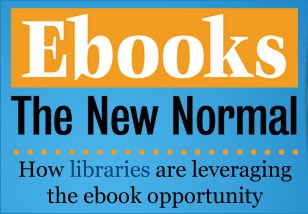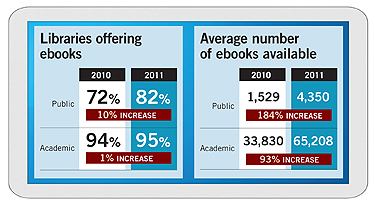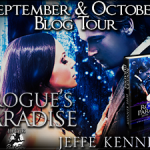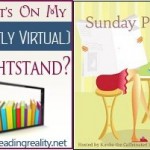 On October 12 I attended the second annual virtual conference about ebooks and libraries, sponsored by Library Journal and School Library Journal. The title of the conference was Ebooks: the New Normal, and I wondered, is it really?
On October 12 I attended the second annual virtual conference about ebooks and libraries, sponsored by Library Journal and School Library Journal. The title of the conference was Ebooks: the New Normal, and I wondered, is it really?
The conference itself was really cool. This is a conference about ebooks, after all. It should be a virtual conference. Requiring a physical conference to talk about a virtual product would be either ironic or contradictory. The sessions were great! At the same time, as one of the attendees pointed out on Twitter, it’s hard to sit down for drinks together afterwards to rehash the conference. Putting it another way, hash tags just don’t taste as good as a glass of wine with new friends after the conference is over.
 But back to that thought about whether ebooks are the new normal, or not. Ebooks are definitely a permanent part of the library landscape. Ian Singer of Media Source quoted adoption rate statistics that ebooks are in over 90% of academic libraries and over 80% of public libraries. But “in” and “integrated” are two different things. A lot of academic library ebook collections are mostly for research. And a lot of public library ebook collections are just getting started.
But back to that thought about whether ebooks are the new normal, or not. Ebooks are definitely a permanent part of the library landscape. Ian Singer of Media Source quoted adoption rate statistics that ebooks are in over 90% of academic libraries and over 80% of public libraries. But “in” and “integrated” are two different things. A lot of academic library ebook collections are mostly for research. And a lot of public library ebook collections are just getting started.
What about those “billion wicked thoughts”? One of the speakers in the afternoon Pecha Kucha session was Ogi Ogas, author of A Billion Wicked Thoughts: What the World’s Largest Experiment Reveals About Human Desire. His advice to libraries regarding ebooks is that we need to not just stock a lot of ebook romances, but that we need to get involved in archiving fanfiction. Wow! Why? Because men like pictures and women like stories, meaning romance fiction. His research follows the publishing trends, and the library ebook circulation trends, that romance sells, and romance circulates. Ebook romances of all stripes and types are the hottest circulating genre of ebooks, and romance authors are the hottest circulating authors except for the big name bestsellers like Patterson and Roberts. Except, hey wait a minute, Nora Roberts is a romance author.
Robin Bradford, Fiction Collection Development Specialist at the Indianapolis-Marion County Public Library, said something similar in her earlier presentation. She said that purchasing for the ebook collection isn’t like buying for the print collection. She showed the top 20 ebooks from IMCPL, and there they were, hot romance authors in the top 20. Lauren Dane had 4 books in the top 20. (Go Lauren, she’s really good!) Robin’s point in general was that the ebook audience may be different from the print audience and we have to purchase what will circulate. Another one of her comments that was clearly a big takeaway based on the Twitter chat was that the ebook users want the authors’ backlist if it’s available. And it increasingly is thanks to publishers like Open Road Media.
But about that whole normal thing? One of the issues that’s part of the old normal, and an even bigger part of the new normal, is budget limitations. Ebooks may not take up any room, and genre fiction can be less expensive than hardcover books, but library budgets have shrunk. We can reallocate money from some other places, like periodicals, and standing orders, and reference books. But databases also cost more, and that expense isn’t going away.
Libraries do a lot of their collection development from reviews. Not for the upcoming bestsellers, the sure things, but authors and titles they don’t know and have never heard of, they do. When a library is looking at an ebook collection, as Robin Bradford and other speakers pointed out, the library shouldn’t be duplicating its print collection. There are a lot of titles from publishers such as Carina and Dreamspinner and Samhain that are ebook-only, and many are written by new or relatively unknown authors. In other words, if these were print, collection development would look for reviews. Even when the individual titles cost less than $5, the money does add up. There are reviews out there, if a librarian is willing to go hunting through the blogosphere, but that takes a lot of time. Or it’s a labor of love. Library Journal has been reviewing ebook-only titles in their Xpress Reviews online since July 2011 (full disclosure: I am one of their reviewers), but libraries need more resources in order to integrate ebook ordering into collection development. We need the equivalent of AudioFile or VOYA for ebook only titles, except online, of course! When that exists, ebooks will truly be the new normal in libraries.
Who’s with me on this?







